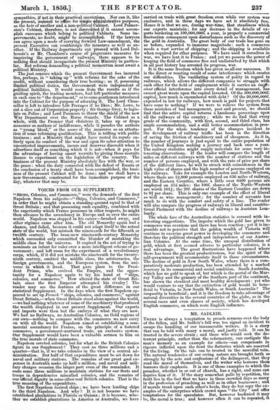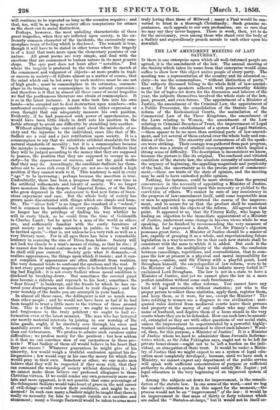MR. SADLEIR.
THERE is always a temptation to preach sermons over the body of the fallen, and Mr. Sadleir's fall was too signal an incident to escape the handling of our innumerable writers. It is a story that can be told with many a moral, and justly told. It can be treated in the severe strain ; and those who would seek the de- terrent principle, rather than the reformatory, can castigate the man's memory as an example for others—can compensate in rigours inflicted upon the dead the flatteries which are reserved for the living. Or the tale can be treated in the merciful vein. The natural tendencies of our erring nature are brought forth so strongly by the acts and confessions of the delinquent, that they read the moral of themselves, and the writer who borrows them borrows their emphasis. It is one of those examples to which the preacher, whether in or out of church, has a right, and none can deprive him of it. If the story somewhat palls by repetition, the fault lies in the-fact that we have in these crowded days so many in the profession of preaching as well as in other businesses ; and if morals tread upon each other's heels, they do but copy the ex- amples of the enterprises which crowd upon "the City' and offer temptations for the speculator. But, however hacied it may be, the moral is true; and however often it can be repeated, it
'will continue to be repeated as long as the occasion requires ; and that, too, will be as long as society offers temptations for crimes as the short cut to social distinction.
- Perhaps, however, the most unfailing characteristic of these great tragedies, when they are inflicted upon society, is the ex- tremely common character of -the incidents, the excessively com- monplace train of feeling which is disclosed. The remark is true, though it will have to be stated in other terms where the tragedy is of a kind that rests more upon the elementary passions of our nature. All great poems are very simple, and deal with the emotions that are commonest to human nature in its most generic shape. The epic poet does not hunt after "novelties." But where the tragedy is produced by the violent °Mot to match at vi
the commonest and t of objects—at mere profits in trade or success in society—it follows almost as a matter of course, that the mind which can be led away by such motives must be one not of high grade ; mast be commonplace in its estimates, common- place in its training, or commonplace in its natural expression; and therefore is it that in almost all these cases of social tragedies we find the posthumous literature one strain of commonplace. It is so in the latest instance. A man who took fate into his own hands—who scrupled not to deal destruction urn numbers—who confronted eternity—appears unable to find either expression or even thought that can adequately measure his own position. Evidently, if he had possessed such power of apprehension, he would have been little likely to drift into his position in the feeble attempt to avoid one difficulty by stumbling into another.
Without admitting the current cant about the misdeeds of so- ciety and the injustice -to the individual, eases like that of Mr. Sadleir are a real and a just retribution upon society. It is a commonplace to say that we substitute artificial standards for the natural standards of morality ; but it is a commonplace because the mistake is common. We teach the undeveloped Sadleirs that they will be judged according to the money that they are supposed to possess, the position that they are supposed to occupy so- ciety—by the appearance of success, and not the good works that they may do. Accordingly, the candidate &dims lay them- selves out to seem rich even if they are not so—to snatch a high position if they cannot work to it. This tendency is said in every " age " to be increasing ; perhaps because the assertion is true. Undoubtedly, there has been a progress during our own time in the artificial refinements and luxury of society. We no longer have monsters like the despots of Imperial Rome, or of the East, who grew depraved in the endeavour to find new forms of luxu- rious enjoyment and ease. But the whole body of society has grown more discontented with things which are simple and hum- ble. The "silver fork" is no longer the standard of a "school," but is common in households of every grade. The literary man no longer has the privilege of finding his way whither he will in rusty black, as he could from the time of Goldsmith to Charles Lamb; but he must be a man of the world as others tire, and sufficiently familiar with the costly furniture of pod society not to make mistakes in public, or "he will not be invited again,"—that is, not unless he is a veryrich as well as a very literary man. For in all ages there has been a remarkable leniency in scanning the sins of Dives from below. Society will not look too closely to a man's means of rising, so that he rise ; if he cannot don its moral costume as well as its material costume, he shall still pass current. Society gets what it demands,—it realizes appearances, the things upon which it insists ; and it can- not complain if appearances are often different from realities. The very demand tends to confound the spurious and the real. It is not every great railway magnate who is to be detected by speak- ing bad English ; it is not every Sadleir whose moral condition is disclosed by breaking-down. 13ut sometimes the coveted guest does become a ridicule and reproach to his host; sometimes the "dear send" is bankrupt, and the frauds by which he has en- tered your drawingroom are disclosed to your disgrace ; and for your worship of the faults you are scourged in your banker.
In almost all these cases, the delinquent is not so much worse than other people ; and he would not have been so bad if he had been taught to trust a little more to the virtues of those around him. This is a Christian country ; we ought to extend mercy and forgiveness to the truly penitent ; we ought to hail re- formation even at the latest moment. The man who has betrayed our merely material interests by joining in our worship of the
false ds, ought, if he sincerely sees through his error and manfully avows the truth, to command our admiration not lees than our forbearance. We profess to admire such candour under difficulties ; we profess mercy for the penitent ; but how seldom is it that we can convince men of our earnestness in these pre- texts ? What Sadleir of them all would believe in his heart that they are sincere ? Whatever guarantees he might give of his sincerity, few would weigh a truthful confession against his de- linquencies; few would copy in his ease the mercy for which they would pray in their own. Somehow or other, we can make men believe that they will be respected if they seem rich, that they. can command the worship of society without disturbing it ; but we cannot make them believe our professed allegiance to those Christian virtues. If we could render our own.generosity more oar- fain and more a.arent, is it not possible that some percentage of thedelinquent Sadleirs would take heart of grace in the mid career of evil-doing—would. review their condition, and might be re- lit:wined ? In such, ease many a Sedleir might be taught that there is wally no necessity for him to commit suicide as a sacrifice and StOnem.ent ; many a George Barnwell would be taken to arms more truly loving than those of Milwood ; many a Paul would be con- verted to trust in a thorough Christianity. Such genuine re- pentanoes, such appeals to our own professions are so rare that we may say they never happen. There is work, then, yet to de for the missionary, even among those who stand over the body of a Sadleir and superciliously preach morals to each other upon his downfall.



































 Previous page
Previous page